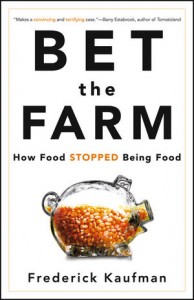
Frederick Kaufman
Bet the Farm
(Wiley, October 2012)
In 2008, farmers grew enough to feed twice the world’s population, yet more people starved than ever before—and most of them were farmers. In Bet the Farm, food writer Kaufman sets out to discover the connection between the global food system and why the food on our tables is getting less healthy and less delicious even as the the world’s biggest food companies and food scientists say things are better than ever. To unravel this riddle, he moves down the supply chain like a detective solving a mystery, revealing a force at work that is larger than Monsanto, McDonalds or any of the other commonly cited culprits—and far more shocking.
Praise for Bet the Farm
“In this energetic, wide-ranging work of investigative journalism, Harper’s editor Kaufman argues that the new food revolution involves collateral products and processes, not food itself. He discusses Big Food through specific products and goes far behind the curtain of corporate processes and practices. The book is often a stew of figures, from dollars to statistics with an alphabet soup of organizational acronyms and italicized buzzwords for flavor. Along the way, it probes the complications of marrying apparent incompatibles such as free market economics and slow food, how food-related information converts to capital, and how technology facilitates and oversimplifies the industry. Hunger, the lack of food, is often Kaufman’s subtext and eventually evolves into his main. Yet this is neither dry argumentative soup nor antiglobalization polemic, and the villains aren’t black and white; Kaufman’s tone is subtly ironic without being snarky—a nice addition to Michael Pollan.”
–Publishers Weekly
“This story should have been on the front page of the New York Times.”
–Jami Floyd, Political Analyst, MSNBC
“Kaufman makes a convincing and terrifying case that the same merchant bankers who destroyed our housing market–and economy–five years ago are at it again. This time their target is the world’s food supply.”
–Barry Estabrook, author of Tomatoland
“Frederick Kaufman’s great skill as a writer is to know when to be an ing??nue and when an outraged critic in his journey through the international food system. In going toe-to-toe with everything from a runaway pizza machine to Bill Gates, he goes to the heart of a complex world and shares why you should be angry. That makes this the best kind of journalism—one from which no one emerges unscathed, nor any reader finishes unmoved.”
—Raj Patel, author of Stuffed and Starved
“In Bet the Farm, Frederick Kaufman connects the dots between the food commodity markets and world hunger. Kaufman is a wonderfully entertaining writer, able to make the most arcane details of such matters as wheat futures crystal clear. Readers will be alternately amused and appalled by his accounts of relief agencies and the interventions of rich nations. This book is a must-read for anyone who cares about feeding the hungry in today’s globalized food marketplace. It’s on the reading list for my NYU classes.”
—Marion Nestle, author of Why Calories Count and Food Politics
“‘Eating is an agricultural act,’ as Wendell Berry said, but Frederick Kaufman shows, undeniably, that it is an economic act as well. Bet the Farm describes a global food system that has made food and money indecipherable, where what we eat is determined not by the seasons, but by the ebb and flow of market forces. It’s a compelling portrait of a system on the edge of crisis, and a necessary call for change.”
—Dan Barber, chef, author, and activist
“Since time immemorial, the most important human question has been ‘What (if anything) is for dinner?’ This book explains how that question is being answered (badly) for our planet right now—the forces that are driving us to human and ecological despair.”
—Bill McKibben, author of Eaarth: Making a Life on a Tough New Planet
“This is more than a book about food. It’s a book about how to revise our usual ways of thinking.”
—Olivier De Schutter, UN Special Rapporteur on the Right to Food
